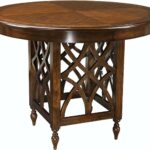While many suppliers’ concerns about ocean freight are subsiding, difficulties with moving freight inland are getting worse.
Ocean freight rates have significantly decreased from their pandemic peak, though they are still significantly higher than pre-pandemic levels. Last week’s average spot rates were $2,404 per container, which is 77% less than their peak from September. 2021. This is 82% higher than the average 2019 rate of $1,420, which is 36% lower than the five-year average.
Moreover, there are now fewer overseas supply disruptions than before, which is good news for many furniture suppliers.
But as one problem resolves, a different one has become more serious.
Given the high cost of fuel, domestic freight has displaced ocean freight as the main logistical barrier for many suppliers.
“Inland freight is awful,” said Rusty Morris, vice president of sales and marketing at American Woodcrafters. “Pricing is ridiculous. Fuel and labor costs are up. It’s making it difficult to hit our strategy of expanding west of the Mississippi. The other thing that’s making it interesting is the shakeup of companies buying others, like Brooks Furniture buying Shelba Johnson. We have a lot of customers that use each. I don’t know how that’s going to work out.”
Inland conditions have surpassed ocean conditions, according to high-end importer Hekman Furniture.
“Trucking companies continue to have more power than we would like,” said Jim O’Keefe, the company’s vice president of sales. “I’m waiting for the pendulum to swing in our favor. It always seems like a conspiracy of factors: Driver shortage, diesel prices, etc. But I see a reduction in demand for consumer goods, which could lower demand for inland freight. Hopefully that will lead to better pricing, but we’re not seeing that yet, especially going to the upper Northwest.
Price isn’t really a problem, according to case goods importer Bernards Furniture; however, delays are.
“There’s some difficulty in managing it, particularly with it getting stuck in hubs,” said Micah Swick, company president. “It’s taking longer to get product. Purely speculating, I think it’s a staffing issue. Everyone is working too hard and too thin. Employment remains a real challenge for everyone. Hopefully all these laid-off people will get absorbed into other workforces.”
Some Domestic Manufacturers See It as An Issue as Well.
“Logistics, mainly domestic trucking for me, is still expensive and transit times remain long,” said Gat Creek President Gat Caperton.
One of the biggest domestic bedroom furniture producers, Vaughan-Bassett, claims that inland freight in the eastern U.S. isn’t too difficult. but is tougher westward.
“We do 90% of our business in the Eastern time zone, and we don’t have many challenges there,” said Doug Bassett, president. “It’s a little challenging getting to the Western half of the country, particularly the Dakotas.”
A different domestic manufacturer, high-end Sherrill Furniture, has largely avoided the problem because of its own dedicated trucking fleet.
“We haven’t really had any logistical or supply issues,” said Dax Allen, vice president of marketing. “That’s due to having our own trucking fleet, which we doubled the size of over the pandemic. We were able to open routes to the West Coast. We used to rely on third parties. Now we use our own trucks, and we’ve gone from doing business in 16 states to 40.”
Others Acknowledge That It’s An Issue, But Are Optimistic About It Overall.
“We see pricing coming down for inland freight, which is sorely needed after the exorbitant prices we experienced during the pandemic,” said Jason Phillips, vice president of Phillips Collection. “Our big focus remains accountability with the bookings we have planned so we forecast our inventory as accurately as possible.”
Fuel prices are decreasing, which is good news for Martin Furniture.
“With fuel prices receding, maybe land freight will be reduced,” said Gil Martin, company founder and CEO. “Fortunately, ocean freight has declined in cost dramatically. We wonder where that will balance out.”
Despite obstacles, Legends Furniture, an American importer and manufacturer, is upbeat.
“We do still see some delays with ground (freight), but that seems to be getting a bit better as well,” said Tim Donk, vice president of sales. “As fuel costs continue to stabilize, we will begin to see the bright light at the end of the tunnel.”
Source: read it here!













